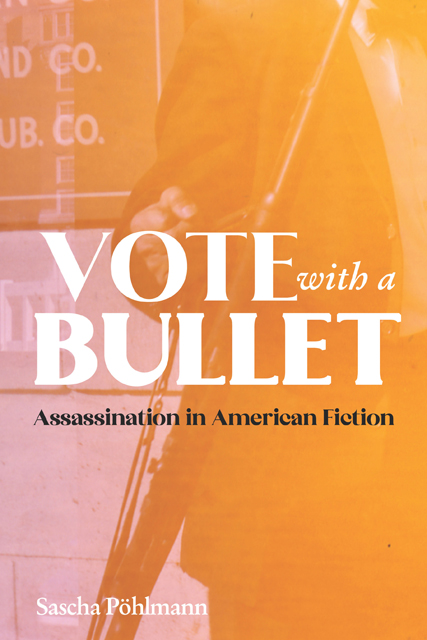Book contents
- Frontmatter
- Dedication
- Contents
- Introduction: The Individual and Society
- 1 The Princess Casamassima (1886)
- 2 The Assassination Bureau, Ltd. (1910/63)
- 3 All the King’s Men (1946)
- 4 Solar Lottery (1955)
- 5 The Manchurian Candidate (1959)
- 6 The Parallax View (1970)
- 7 Libra (1988)
- 8 The Dead Zone (1979)
- 9 11/22/63 (2011)
- 10 Big If (2002)
- 11 Checkpoint (2004)
- 12 The Good Father (2012)
- Conclusion
- Works Cited
- Index
Introduction: The Individual and Society
Published online by Cambridge University Press: 14 January 2023
- Frontmatter
- Dedication
- Contents
- Introduction: The Individual and Society
- 1 The Princess Casamassima (1886)
- 2 The Assassination Bureau, Ltd. (1910/63)
- 3 All the King’s Men (1946)
- 4 Solar Lottery (1955)
- 5 The Manchurian Candidate (1959)
- 6 The Parallax View (1970)
- 7 Libra (1988)
- 8 The Dead Zone (1979)
- 9 11/22/63 (2011)
- 10 Big If (2002)
- 11 Checkpoint (2004)
- 12 The Good Father (2012)
- Conclusion
- Works Cited
- Index
Summary
Every election—from the most democratic to the most bogus—is an event in which a fundamental dichotomy of modernity presents itself in an immediate and condensed form: that between society and the individual. This duality is one of the broadest philosophical frameworks in which to understand the issue of political choice. A democratic election is based on the one-person-one-vote principle, and we expressly cast our votes as individuals; there is probably no better illustration of this individualism than the photos of ink-stained thumbs that are so eagerly published by Western media whenever a country holds its first democratic election. Politicians keep reminding citizens of the power they possess through their vote, and we are urged from all quarters to cast our ballot and thus participate in the democratic process.
At the same time, this emphasis on individual democratic responsibility is haunted by its opposite, the society in which these individuals find themselves, and also the mass in which they may disappear. After all, a single vote is just that, and in the polls and media representations of results every single vote seems like a drop in the ocean of percentages. Paradoxically, every election is therefore always a reminder of both the importance and the insignificance of that single vote, and by extension of the individual and their political beliefs. The individual vote both seems to make all the difference and no difference. (Democratic and nondemocratic elections could be distinguished along those lines; in the former, the individual may feel the insignificance of their vote, while in the latter they know it.) On the one hand, the individual seems to have immense political power in this vote, and they are wooed by politicians and their parties, yet on the other hand, the individual may believe that they only get to exert political power every few years, and only in an indirect way—especially in the US system where an electoral college elects the president, not the voter directly. (President Trump’s entirely unfounded allegations of fraud after he lost the 2020 election in both the popular vote and the electoral college only added a new and highly problematic aspect to this perceived powerlessness, as these insinuations dangerously suggested yet another dimension of insignificance with regard to individual votes: that they would not be counted if cast for the “wrong” candidate.)
- Type
- Chapter
- Information
- Vote with a BulletAssassination in American Fiction, pp. 1 - 20Publisher: Boydell & BrewerPrint publication year: 2021



